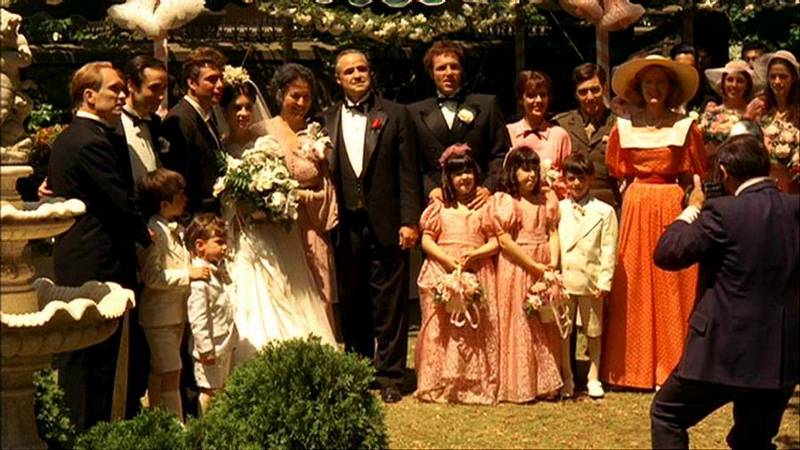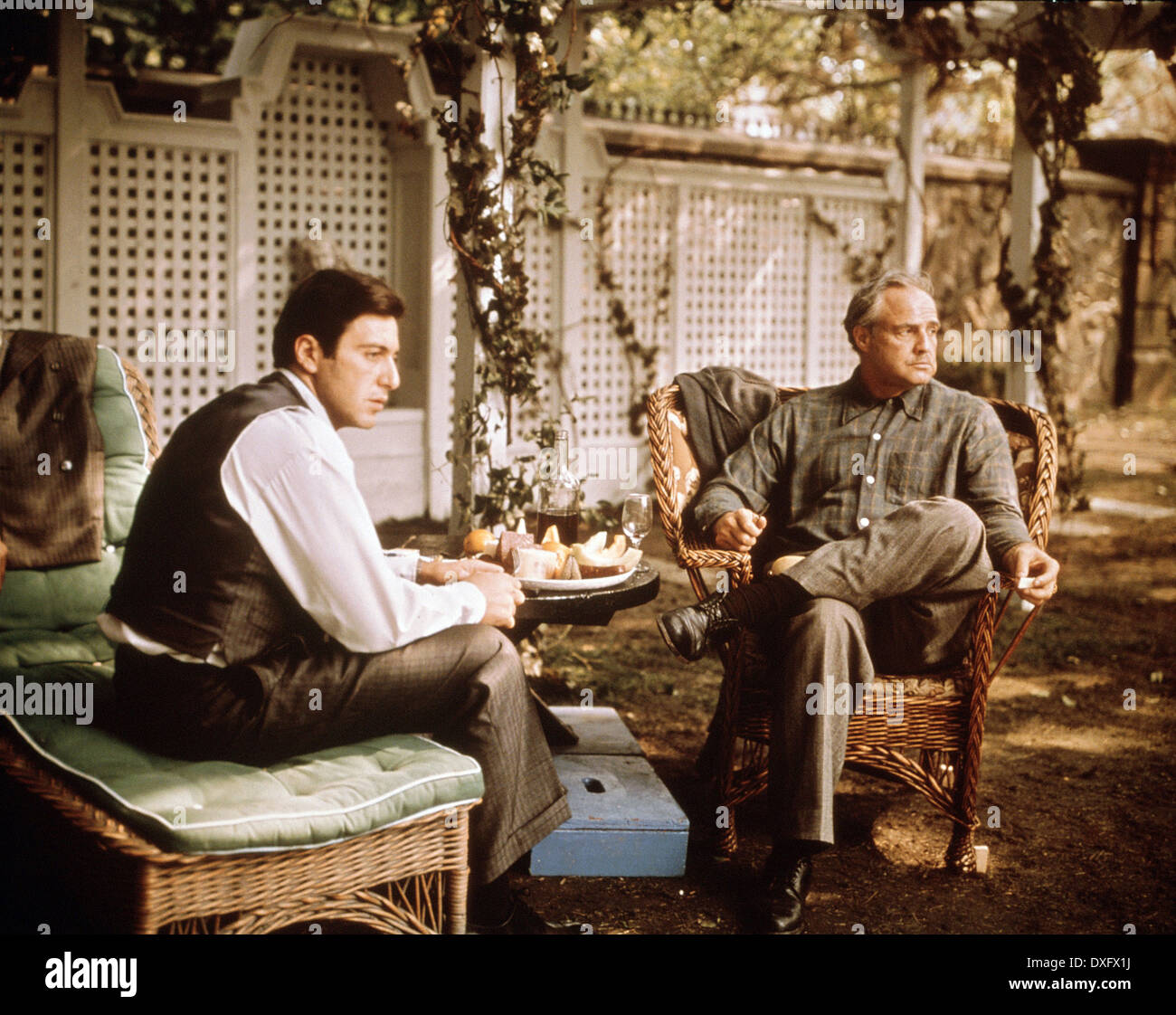← Back to Reviews
in
The Godfather
An instant classic and the Oscar winner for Best Picture of 1972, The Godfather is the sweeping and electrifying epic that set the gold standard for mob drama without ever utilizing the word "mob" or "mafia". At its core, what Francis Ford Coppola has done here is crafted an effectively layered look at the varied definitions of the word "family."

The film opens at what is considered a classic family event...the wedding of the daughter of Vito Corleone, the dying patriarch of a crime dynasty whose power, reach, influence, and respect knows no bounds and what happens when an attempt on Vito's life motivates him to gradually hand over control of his empire to his reluctant son, Michael, who has never had the same kind of interest in the business as his hot-headed brother, Sonny, his adopted brother Tom, who serves as the organization's lawyer, and the weak-willed Fredo, who wants more than anything to have an important role in the running of his father's organization, but has neither the skill nor the stomach.

The Oscar-winning screenplay by Coppola and Maria Puzo, who wrote the book the film is based on, seamlessly weaves several different stories involving the family's sometimes very quiet way of wresting control of several different dramas, including a famous singer (a character allegedly based on Frank Sinatra), who seeks Vito's assistance in getting a role in a movie, fending off a rival family who want the Corleone's to expand their empire to the drug trade, an area that , surprisingly, Vito wants nothing to do with but Sonny does, and a dirty cop who has assaulted Michael and must be eliminated.

Coppola displays an uncanny ability to use violence to greatest effect by not having the entire film be a blood bath. Even though the wedding of Vito's daughter, Connie is also utilized as an opportunity to gain favor from the Don, we are surprised when the first request of the Corleone influence in a matter is politely refused by Vito. Violence is not utilized for violence's sake and the violence in this film doesn't fill every frame of the film. We learn that violence is a final option for the Corleones when everything else has failed and when it comes down to that, they don't play...Sonny's bloody demise being a prime example. Of course, violence becomes the ultimate storytelling tool in the restaurant scene where Michael takes out the dirty cop and the drug kingpin, the stunning turning point of the film where the film stops being about Don Corleone and starts being about Michael.

At the center of all the bloodshed is an almost Shakespeare-like look at a royal family and how the obvious choice to take over the throne is not a willing participant at first. Love when Michael and his new girlfriend, Kay arrive at the wedding and Kay starts asking him all these questions about the family business and Michael tries diplomatically to explain without really explaining. This scene is so beautifully written because it is the beginning of the reveal of how Michael is more like his father than any of his brothers.

I also love the unerring detail that Coppola puts into the detail of the setting up of the restaurant assassination. It's so deft having all of these guys quietly putting their heads together to figure out how this has to be done, and then watch Michael execute it precisely as planned. Masterful storytelling that sends the film to a completely different level. Have to wonder how popular this film would have been if made now during this "Me too" area with the humiliating and abusive treatment of the female characters, especially Connie, the lovely bride of the opening scene, whose fairy tale wedding was a precursor to doom.

The film was nominated for 10 Academy Awards, but people tend to forget that even though it did win Best Picture, it only won two other awards that night...for Coppola and Puzo's screenplay and Marlon Brando's second Oscar for Outstand Lead Actor, an award he would refuse. The big winner that night was Cabaret, which won eight awards that night, including Bob Fosse's shocking blindsiding of Coppola for Best Director.

Brando commands the screen and revived his sagging career, for what is essentially a supporting role. He's top billed and won Best Actor because he was Marlon Brando. Robert Duvall and James Caan both received nominations for their roles as legal eagle Tom and hothead Sonny. There's also standout work from Richard Castellano, Al Lettieri, Diane Keaton as Kay, and a heartbreaking turn from John Cazale as Fredo, but for my money, Al Pacino owns this movie with his understated yet powerful Michael, a performance that earned him a supporting nomination, even though the role is clearly a lead. Despite a few roles prior to it, this is the one that made Pacino an official movie star and deservedly so. There have been many imitations and rip-offs, but they all pale next to this granddaddy of them all, where the primary credit has to go the enormously gifted Francis Ford Coppola.
An instant classic and the Oscar winner for Best Picture of 1972, The Godfather is the sweeping and electrifying epic that set the gold standard for mob drama without ever utilizing the word "mob" or "mafia". At its core, what Francis Ford Coppola has done here is crafted an effectively layered look at the varied definitions of the word "family."

The film opens at what is considered a classic family event...the wedding of the daughter of Vito Corleone, the dying patriarch of a crime dynasty whose power, reach, influence, and respect knows no bounds and what happens when an attempt on Vito's life motivates him to gradually hand over control of his empire to his reluctant son, Michael, who has never had the same kind of interest in the business as his hot-headed brother, Sonny, his adopted brother Tom, who serves as the organization's lawyer, and the weak-willed Fredo, who wants more than anything to have an important role in the running of his father's organization, but has neither the skill nor the stomach.

The Oscar-winning screenplay by Coppola and Maria Puzo, who wrote the book the film is based on, seamlessly weaves several different stories involving the family's sometimes very quiet way of wresting control of several different dramas, including a famous singer (a character allegedly based on Frank Sinatra), who seeks Vito's assistance in getting a role in a movie, fending off a rival family who want the Corleone's to expand their empire to the drug trade, an area that , surprisingly, Vito wants nothing to do with but Sonny does, and a dirty cop who has assaulted Michael and must be eliminated.

Coppola displays an uncanny ability to use violence to greatest effect by not having the entire film be a blood bath. Even though the wedding of Vito's daughter, Connie is also utilized as an opportunity to gain favor from the Don, we are surprised when the first request of the Corleone influence in a matter is politely refused by Vito. Violence is not utilized for violence's sake and the violence in this film doesn't fill every frame of the film. We learn that violence is a final option for the Corleones when everything else has failed and when it comes down to that, they don't play...Sonny's bloody demise being a prime example. Of course, violence becomes the ultimate storytelling tool in the restaurant scene where Michael takes out the dirty cop and the drug kingpin, the stunning turning point of the film where the film stops being about Don Corleone and starts being about Michael.

At the center of all the bloodshed is an almost Shakespeare-like look at a royal family and how the obvious choice to take over the throne is not a willing participant at first. Love when Michael and his new girlfriend, Kay arrive at the wedding and Kay starts asking him all these questions about the family business and Michael tries diplomatically to explain without really explaining. This scene is so beautifully written because it is the beginning of the reveal of how Michael is more like his father than any of his brothers.

I also love the unerring detail that Coppola puts into the detail of the setting up of the restaurant assassination. It's so deft having all of these guys quietly putting their heads together to figure out how this has to be done, and then watch Michael execute it precisely as planned. Masterful storytelling that sends the film to a completely different level. Have to wonder how popular this film would have been if made now during this "Me too" area with the humiliating and abusive treatment of the female characters, especially Connie, the lovely bride of the opening scene, whose fairy tale wedding was a precursor to doom.

The film was nominated for 10 Academy Awards, but people tend to forget that even though it did win Best Picture, it only won two other awards that night...for Coppola and Puzo's screenplay and Marlon Brando's second Oscar for Outstand Lead Actor, an award he would refuse. The big winner that night was Cabaret, which won eight awards that night, including Bob Fosse's shocking blindsiding of Coppola for Best Director.

Brando commands the screen and revived his sagging career, for what is essentially a supporting role. He's top billed and won Best Actor because he was Marlon Brando. Robert Duvall and James Caan both received nominations for their roles as legal eagle Tom and hothead Sonny. There's also standout work from Richard Castellano, Al Lettieri, Diane Keaton as Kay, and a heartbreaking turn from John Cazale as Fredo, but for my money, Al Pacino owns this movie with his understated yet powerful Michael, a performance that earned him a supporting nomination, even though the role is clearly a lead. Despite a few roles prior to it, this is the one that made Pacino an official movie star and deservedly so. There have been many imitations and rip-offs, but they all pale next to this granddaddy of them all, where the primary credit has to go the enormously gifted Francis Ford Coppola.
